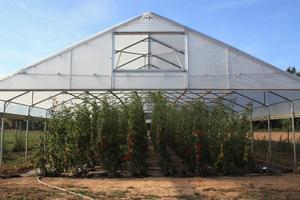Research team from the University of Göttingen investigates the influence of storage on the flavour of ripe tomatoes

Credit: Division of Quality of Plant Products, University of Göttingen
There is much debate about the correct storage of tomatoes. There are two main options available to consumers: storage in the refrigerator or at room temperature. A research team from the University of Göttingen has now investigated whether there are differences in the flavour of ripe tomatoes depending on how they are stored and taking into account the chain of harvesting from farm to fork. No perceptible difference was found: the variety of tomato is much more important. The results have been published in the journal Frontiers in Plant Science.
How does the flavour change when ripe, picked tomatoes go through a commercial post-harvest chain and are then stored either in the refrigerator (7 degrees Celsius) or at room temperature (20 degrees Celsius)? Researchers from the Division of Quality of Plant Products at the University of Göttingen analysed flavour-related attributes in new tomato strains drawing on the expertise of a “sensory panel”. The sensory panel consisted of experienced and trained assessors who use their senses to perceive and evaluate the sensory properties of products. Among other attributes, this panel examined the discernible sweetness, acidity and juiciness of tomatoes. No significant differences in flavour were found between the two storage options when the entire post-harvest chain is taken into account.
“It is the variety of tomato in particular that has an important influence on the flavour. Therefore, the development of new varieties with an appealing flavour can be a step towards improving the flavour quality of tomatoes,” says Larissa Kanski, lead author of the study. “The shorter the storage period, the better it is for the flavour and related attributes. However, we were able to show that, taking into account the entire post-harvest chain, short-term storage of ripe tomatoes in the refrigerator did not affect the flavour,” reports Head of Division Professor Elke Pawelzik.
###
Original publication: Kanski L, Naumann M and Pawelzik E (2020) Flavor-Related Quality Attributes of Ripe Tomatoes Are Not Significantly Affected Under Two Common Household Conditions. Frontiers in Plant Science (2020). Doi: https:/
The study is part of the PETRAq+n – project (Partizipative Entwicklung von QualitätsTomaten für den nachhaltigen regionalen Anbau), which is financially supported by the Ministry for Science and Culture of Lower Saxony (VWZN3255).
Contact
Professor Elke Pawelzik
University of Göttingen
Department of Crop Sciences, Division of Quality of Plant Products
Carl-Sprengel-Weg 1, 37075 Göttingen, Germany
Tel: +49 (0)551 395545
Email: [email protected]
Larissa Kanski
University of Göttingen
Division of Quality of Plant Products
Email: [email protected]
Media Contact
Melissa Sollich
[email protected]
Original Source
https:/
Related Journal Article
http://dx.




